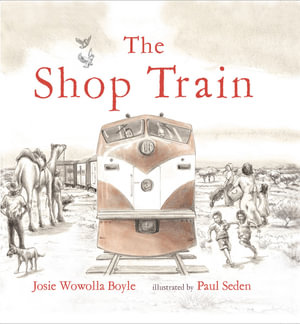The shop train by Josie Wowolla Boyle. Illus. by Paul Seden

In this loving memorial to times past, Josie recalls travelling to the train to get supplies and the mayhem caused when the bags split on the way home. Her recollections of times with her family, using the Shop Train as their supplier brings back many images of the part these trains played in many Australians’ lives. That this service ceased to run in 1996 is astonishing. And may beg the question of what happens now when goods are needed by people living along the train line.
The East West train line running from Port Augusta to Kalgoorlie and back supplied not only the railway men and their families but all those people who lived in remote communities along the way. Josie recalls the things they bought, the different sections of the train, catering for all sorts of needs, the excitement of the people when one was due, the hearing of its whistle in the heat, the interplay of the driver and the children. Josie tells the story from the perspective of Rosie a young excited child, driving with her mother through the remote and harsh Wonghi country to meet the train. The rough dirt road gives a hint of what might happen on the way back.
Aboard the train, Rosie’s mother buys groceries in brown paper bags while Rosie watches the mail being thrown off the train into the ute, and where the green groceries and vegetables are bought. Alongside is a hairdresser, a butcher's shop and clothing store. Each section is busy with customers.
A tribute to times past, The shop train will encourage readers to think about change and the way of life now no longer seen. This new book by Josie Boyle is a warmhearted and loving testament to her work as well as her family and the life they lived in this remote landscape. And is a fitting memorial to Josie who died in 2020.
Seden’s illustrations, done mainly in septa with an occasional splash of colour, are majestic in detailing the remoteness of their lives, but also the richness of their knowledge using both Indigenous and European resources to solve a problem.
Seden includes details which readers will relish: the occasional animal in the background, the array of vehicles, the detail of the train, the number and types of carriages, the vastness of the horizon. All will be intrigued and many readers will spend time deliberating over the particulars in the lives of these children.
And they may try out a wooden yardy dish for themselves to see if they can separate the tea leaves from the rice, or the flour from the sugar as Rosie’s mother does. Descriptions of the land on which they live give a blunt look at the harshness of these people’s lives, punctuated by trips to the Shop train. Teacher's notes are available.
Themes: Aboriginal themes, Outback Australia, Tea and Sugar Train, Trains, Humour.
Fran Knight